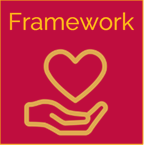Safe & Healthy Learning Environments
The following components are incorporated in Arizona 21st CCLC applications and program implementation:
- Students are served in an easily accessible environment.
- Site administrator and site coordinator must jointly develop a plan of action for safety and communication relevant to their student needs and community.
Sites will need to demonstrate these requirements by completing an annual 21st CCLC Program Basic Emergency Plan prior to the start of the program.
- Healthy food. Provide child nutrition programs including after school snack and summer meals. Most of Arizona 21st CCLC programs also offer free breakfast as part of their program and evening meals are increasingly being offered as well.
- Safe transportation from school or an alternative program site if that is part of the program.
The Arizona 21st CCLC team has created frameworks to assist program leaders and their community to better understand key elements of successful 21st CCLC program implementation. Click here or the icon to view the Safe & Healthy Environment Framework
Sites must provide assurance that the program is taking place in a safe and easily accessible facility.
21st CCLC Program Basic Emergency Plan
District’s or Site’s will annually adapt an existing Emergency Operation Plan, or develop a new one if necessary, as a 21st CCLC Program Basic Emergency Plan document for the program site.
The deadline for completing the program site’s 21st CCLC Program Basic Emergency Plan is prior to the start of the program in the fall of each year.
This Plan must be updated yearly, made available, along with any supporting documentation, to the assigned Program Specialist during the compliance visit. Please contact the Specialist with any questions and/or technical assistance needed.
*Note: The 21st CCLC Program Basic Emergency Plan document will be a compliance requirement for all sites. Any updates made throughout the year should be communicated to your Specialist.
For additional resources, please refer to:
Arizona’s 21st CCLC Department of Education supports the efforts of federal school nutrition programs that can assist centers with providing snacks or meals for out-of-school time. Centers must provide snacks that meet the federal nutrition guidelines for after school care snack programs. All 21st CCLC sites are responsible for offering snacks and applying for reimbursement programs that provide students afterschool snacks and summer meals during the 21st CCLC summer program that meet USDA nutrition guidelines.
Reimbursement for snacks are available to eligible programs that apply and follow federal guidelines. Arizona’s Health and Nutrition services can support 21st CCLC grant sites with this process. Food Banks across Arizona can also partner with a site to aid in offering federal child nutrition meal programs.
- Please use the Afterschool Snack page or contact Arizona’s Health and Nutrition services for additional information.
- The At- Risk Afterschool Program is a federally funded meal program that is organized in safe and structured after school environments. Learn more about the At-Risk Afterschool Meals Program.
- How to participate in the At- Risk Afterschool Meals Component of CACFP
- Community Food Bank of Southern Arizona
- Mary’s Food Bank Alliance – Children’s Feeding Programs.
- United Food Bank – Kids Café
- The National Lunch Program (NSLP) offers reimbursement to help Local Education Agencies (LEAs) serve snacks to children in Afterschool Care, or extended school day activities aimed at promoting the health and wellbeing of children and youth. To participate in the ASCSP, schools must complete Section 10, Afterschool Care Snack Programs, on the site application in CNPWeb.
Programs must establish a plan for the transportation of grant participants that clearly demonstrates procedures as described in the District Site original approved grant application and follows the District’s transportation procedures.
Example: student walker, parent pick-up, and bus transportation.
- It is the fiduciary responsibility of the LEA to avoid supplanting with student transportation costs.
- Transportation cost billed to the 21st CCLC grant should not exceed 4% of the annual budget when deemed necessary.
- For additional questions related to transportation, please communicate with your assigned Program Specialist.









